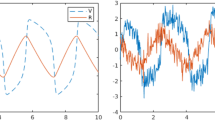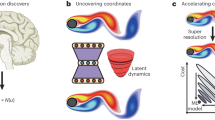Abstract
We develop a stochastic optimization framework to identify governing equations in multi-physics systems. The proposed approach discovers partial differential equations (PDEs) by combining user’s prior knowledge of the underlying physics of a target system and its observed data. The technique relies on evolutionary processes to randomly generate PDEs and stochastically optimize their structure and coefficients to the data by exploring the infinite model space. Furthermore, the method captures the spatiotemporal dynamics of physical system by direct evaluation of the candidate PDEs under physical constraints. To achieve significant computational speedup, the proposed stochastic optimization method relies on a series of novel modifications. These consist of the incorporation of a multi-purpose loss function into the parallel fitness test and bloat control techniques into the evolutionary processes. As such, these innovations lead to a significant improvement of the effectiveness and computational efficiency in identifying PDEs from given data. We demonstrate the applicability of methodology in two illustrative examples: the nonlinear Burgers’ equation and the linear/nonlinear advection-dispersion equation. The exact PDEs are successfully identified, even with significant data noise, and captures the underlying physics of the target system. Through series of simulations, we assess the accuracy, robustness, and limitations of the proposed approach. In particular, we show the impact of key dimensionless groups (that accounts for the competition between various physical phenomena) in controlling the accuracy of the identification process. This work shows that developed identification method is a promising effective and robust gray box modeling tool for identifying PDEs.











Similar content being viewed by others
Data availability
All the result data presented in the paper are available together with the code in Github (http://github.com/**woousc/GPSI).
References
Blasch, E., Ravela, S., Aved, A.: Handbook of Dynamic Data Driven Applications Systems. Springer, Cham (2018)
Bolourchi, A., Masri, S.F., Aldraihem, O.J.: Development and application of computational intelligence approaches for the identification of complex nonlinear systems. Nonlinear Dyn. 79(2), 765–786 (2015)
Bolourchi, A., Masri, S.F., Aldraihem, O.J.: Studies into computational intelligence and evolutionary approaches for model-free identification of hysteretic systems. Comput.-Aided Civ. Infrastruct. Eng. 30(5), 330–346 (2015)
Brewick, P.T., Masri, S.F.: An evaluation of data-driven identification strategies for complex nonlinear dynamic systems. Nonlinear Dyn. 85(2), 1297–1318 (2016)
Brunton, S.L., Proctor, J.L., Kutz, J.N.: Discovering governing equations from data by sparse identification of nonlinear dynamical systems. Proc. Natl. Acad. Sci. 113(15), 3932–3937 (2016)
Chatzi, E.N., Smyth, A.W., Masri, S.F.: Experimental application of on-line parametric identification for nonlinear hysteretic systems with model uncertainty. Struct. Saf. 32(5), 326–337 (2010)
Cranmer, M., Sanchez-Gonzalez, A., Battaglia, P., et al. Discovering symbolic models from deep learning with inductive biases (2020). ar**v:2006.11287
Dal Santo, N., Deparis, S., Pegolotti, L.: Data driven approximation of parametrized PDEs by reduced basis and neural networks. J. Comput. Phys. 416(109), 550 (2020)
Holland, J.H., et al.: Adaptation in Natural and Artificial Systems: An Introductory Analysis with Applications to Biology, Control, and Artificial Intelligence. MIT press, Cambridge (1992)
CARC (Center for Advanced Research Computing): Computation for the work described in this paper was supported by the University of Southern California’s CARC (carc.usc.edu) (2021)
Im, J., Rizzo, C.B., de Barros, F.P.J., et al.: Application of genetic programming for model-free identification of nonlinear multi-physics systems. Nonlinear Dyn. 104, 1–20 (2021)
Jagtap, A.D., Kharazmi, E., Karniadakis, G.E.: Conservative physics-informed neural networks on discrete domains for conservation laws: applications to forward and inverse problems. Comput. Methods Appl. Mech. Eng. 365(113), 028 (2020)
Kocijan, J., Girard, A., Banko, B., et al.: Dynamic systems identification with gaussian processes. Math. Comput. Model. Dyn. Syst. 11(4), 411–424 (2005)
Koza, J.R.: Genetic Programming: On the Programming of Computers by Means of Natural Selection, vol. 1. MIT Press, Cambridge (1992)
Lai, Z., Nagarajaiah, S.: Sparse structural system identification method for nonlinear dynamic systems with hysteresis/inelastic behavior. Mech. Syst. Signal Process. 117, 813–842 (2019)
Liu, W.K., Karniadakis, G., Tang, S., et al.: A computational mechanics special issue on: data-driven modeling and simulation-theory, methods, and applications. Comput. Mech. 64, 275–277 (2019)
Ljung, L.: System Identification. Wiley Encyclopedia of Electrical and Electronics Engineering, pp. 1–19. Wiley, New York (1999)
Long, Z., Lu, Y., Dong, B.: PDE-Net 2.0: learning PDEs from data with a numeric-symbolic hybrid deep network. J. Comput. Phys. 399(108), 925 (2019)
Noël, J.P., Esfahani, A.F., Kerschen, G., et al.: A nonlinear state-space approach to hysteresis identification. Mech. Syst. Signal Process. 84, 171–184 (2017)
Panteleev, A.V., Lobanov, A.V.: Mini-batch adaptive random search method for the parametric identification of dynamic systems. Autom. Remote Control 81(11), 2026–2045 (2020)
Quaranta, G., Lacarbonara, W., Masri, S.F.: A review on computational intelligence for identification of nonlinear dynamical systems. Nonlinear Dyn. 99, 1–53 (2020)
Raissi, M., Karniadakis, G.E.: Hidden physics models: machine learning of nonlinear partial differential equations. J. Comput. Phys. 357, 125–141 (2018)
Raissi, M., Perdikaris, P., Karniadakis, G.E.: Physics-informed neural networks: a deep learning framework for solving forward and inverse problems involving nonlinear partial differential equations. J. Comput. Phys. 378, 686–707 (2019)
Ribeiro, B., Albrecht, R.F., Dobnikar, A., et al.: Adaptive and natural computing algorithms. In: Proceedings of the International Conference in Coimbra, Portugal. Springer (2005)
Rudy, S., Alla, A., Brunton, S.L., et al.: Data-driven identification of parametric partial differential equations. SIAM J. Appl. Dyn. Syst. 18(2), 643–660 (2019)
Rudy, S.H., Brunton, S.L., Proctor, J.L., et al.: Data-driven discovery of partial differential equations. Sci. Adv. 3(4), e1602614 (2017)
Sahoo, S. S., Lampert, C. H., Martius, G.: Learning equations for extrapolation and control (2018). ar**v:1806.07259
Schmidt, M., Lipson, H.: Distilling free-form natural laws from experimental data. Science 324(5923), 81–85 (2009)
Schneider, J., Kirkpatrick, S.: Stochastic Optimization. Springer, Berlin (2007)
Tartakovsky, A.M., Marrero, C.O., Perdikaris, P., et al.: Physics-informed deep neural networks for learning parameters and constitutive relationships in subsurface flow problems. Water Resour. Res. 56(5), e2019WR026731 (2020)
Acknowledgements
**woo Im acknowledges the Kwanjeong Educational Foundation (17AmB25D) for financial support.
Funding
Kwanjeong Educational Foundation (17AmB25D) for financial support.
Author information
Authors and Affiliations
Contributions
All authors contributed to the study conception and design. Material preparation and coding were performed by JI. Analysis of the results were performed by JI, FPJdB and SM. The first draft of the manuscript was written by JI and all authors commented on previous versions of the manuscript. All authors read and approved the final manuscript.
Corresponding author
Ethics declarations
Conflict of interest
The authors declare that they have no conflict of interest.
Code availibility
Genetic Programming for System Identification (GPSI), is written in Python (version 3.7.4) with the SymPy library (version 1.7.1) and is available in Github (https://github.com/**woousc/GPSI).
Additional information
Publisher's Note
Springer Nature remains neutral with regard to jurisdictional claims in published maps and institutional affiliations.
Rights and permissions
Springer Nature or its licensor (e.g. a society or other partner) holds exclusive rights to this article under a publishing agreement with the author(s) or other rightsholder(s); author self-archiving of the accepted manuscript version of this article is solely governed by the terms of such publishing agreement and applicable law.
About this article
Cite this article
Im, J., de Barros, F.P.J. & Masri, S.F. Data-driven identification of partial differential equations for multi-physics systems using stochastic optimization. Nonlinear Dyn 111, 1987–2007 (2023). https://doi.org/10.1007/s11071-022-08182-z
Received:
Accepted:
Published:
Issue Date:
DOI: https://doi.org/10.1007/s11071-022-08182-z




